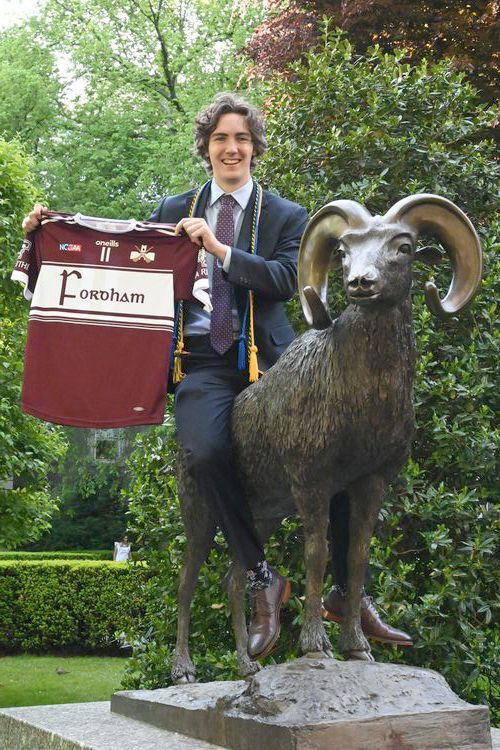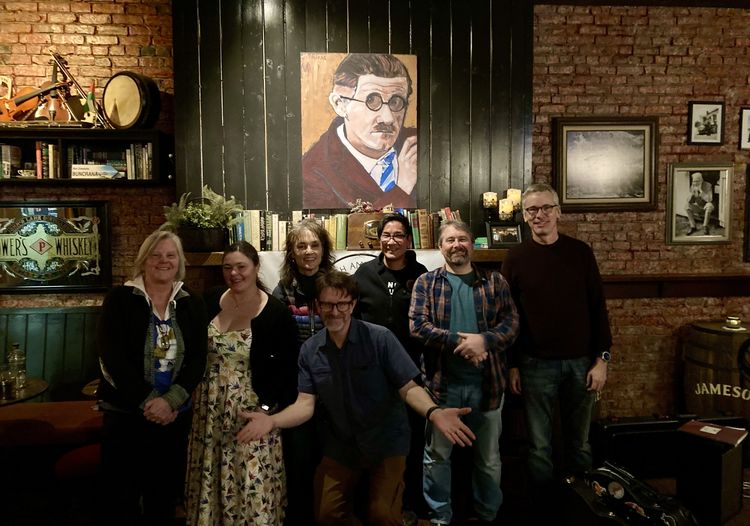In the Spring of 2022, Fordham University student John McGuire wanted to re-energize the moribund state of Irish activities on its Bronx campus. Though Fordham had a Gaelic society, covid had greatly diminished its activities and there were few Irish events happening on campus. McGuire, from Sparta, N.J., the son of Mary McGuire, nee Twomey, from Killmurry, Co. Cork, started Fordham’s Gaelic football team and also began to consider other ways of reviving Irish culture at the school.
McGuire was continuing an old, rich Irish tradition at Fordham. The University was founded in 1841 as Saint John’s College by Tyrone-born Archbishop John Hughes and the university has educated 10s of thousands of Irish Americans over its more than 170 years of existence. In 1922, Fordham Professor Edward Kavanaugh became the first college professor to teach Gaelic language courses in the United States. Four years later, Professor Joseph Campbell opened America’s first recognized school of Irish studies in the United States. A 1941 New York Times article cited Fordham Professor Collins Healy stating that the university employed 17 professors of Irish studies, more than any other American university.
The Times article also described Fordham as “the popular center of Irish Culture in the United States.” According to the article, Fordham taught 42 distinct courses and a seminar in that period including history, art, music, psychology, Gaelic literature, Anglo-Irish poetry, drama, and Irish relations to English literature. Between 1921 and 1941, Fordham had more than 2,100 students registered in Irish studies more registrants than any other American university. For many years, Professor Maurice O’Connell, Irish Liberator Daniel O'Connell's great-grandson, also taught history at Fordham.
For decades, starting in 1932, Fordham hosted an Irish feis, which annually attracted 10s of thousands of spectators. In 1951, 35,000 people attended the Feis that witnessed 2,000 competitors in Irish dance and other Gaelic competitions. Fordham is also home to New York’s most popular Irish radio program, “Ceol na nGael” ("Music of the Irish"), which began in 1974 when two Fordham students, Gerry Murphy, and Mary Maguire, started to play Irish music on WFUV, and for almost a half-century the program has been hosted by students, keeping the tradition alive.
Fordham has honored many prominent Irish politicians, including Taoiseach John Costello (served from 1948-51 and from 1954-57), who received an honorary doctorate, President Mary Robinson, who made its commencement address in 1995, and President Mary McAleese, who received an honorary doctorate in 2010.
McGuire and other members of the Fordham community, alarmed by the rapid disappearance of Irishness in the Bronx, and determined to record it for posterity, formed Fordham’s Bronx Irish Oral History Project, to document and preserve the many stories of the Bronx Irish. Under the leadership of Galwayman Dr. Christopher Maginn, the project has conducted 28 interviews, documenting a wide variety of Bronx Irish- American stories and creating a priceless record of the spiritual, political, cultural, and educational evolution of Bronx Irish Communities. Those interviews included such inspirational stories as how Dean John Feerick rose from a working-class Irish immigrant family in the South Bronx to help create the Twenty-Fifth Amendment to the United States Constitution and become the Dean of Fordham’s Law School and Edward Kelly also related how he came from a family of Bronx firefighters to graduate from West Point and become a United States Army general.
Sadly, Fordham has only partially funded Its Irish Oral History Project and the project is seeking donations to allow its vital work to continue. If you wish to contribute the link, please click on this link:
https://www.givecampus.com/campaigns/33345/donations/new
No donation is too small and the project’s staff hopes that the generosity of the Irish community will allow it to continue preserving the Bronx’s proud Irish culture.








